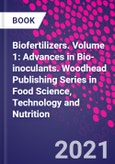Biofertilizers, Volume One: Advances in Bio-inoculants provides state-of-the-art descriptions of various approaches, techniques and basic fundamentals of BI used in crop fertilization practices. The book presents research within a relevant theoretical framework to improve our understanding of core issues as applied to natural resource management. Authored by renowned scientists actively working on bio-inoculant, biofertilizer and bio-stimulant sciences, the book addresses the scope of inexpensive and energy neutral bio-inoculant technologies and the impact regulation has on biofertilizer utilization. This book is a valuable reference for agricultural/environmental scientists in academic and corporate environments, graduate and post-graduate students, regulators and policymakers.
Please Note: This is an On Demand product, delivery may take up to 11 working days after payment has been received.
Table of Contents
1. General concepts2. Production technology, properties and quality management
3. Status of research and application of biofertilizers: Global scenario
4. Mechanisms and applications
5. Quality control
6. Setting up a biofertiliser unit
7. Relevance in organic agriculture
8. Global scenario of biofertilizer production and consumption
9. Quality standards for production and marketing of biofertilizers
10. Constraints in biofertilizer production
Authors
Amitava Rakshit Faculty Member, Department of Soil Science and Agricultural Chemistry, Institute of Agricultural Sciences, Banaras Hindu University, India. Amitava Rakshit is a faculty member of the Department of Soil Science and Agricultural Chemistry at the Institute of Agricultural Sciences, Banaras Hindu University. His research areas include nutrient use efficiency, simulations modelling, organic farming, integrated nutrient management, and bioremediation. His consulting capabilities are composting techniques, soil health management, and input quality control. He is currently the Chief Editor of the International Journal of Agriculture Environment and Biotechnology. He is a member of the Global Forum on Food Security and Nutrition of FAO, Rome, and the Commission on Ecosystem Management of International Union for Conservation of Nature. Vijay Singh Meena ICAR.Dr. Vijay Singh Meena has made remarkable contributions in the field of agricultural research, aligning his efforts with the United Nations Sustainable Development Goals (SDGs). Particularly, his work focuses on evaluating and promoting climate-resilient technologies for diverse cropping systems, directly contributing to SDG 2 (Zero Hunger) and SDG 13 (Climate Action).
His expertise lies in optimizing input usage, fostering carbon-neutral farming practices, and enhancing productivity and profitability in agriculture, which are integral to achieving SDG 2 by ensuring food security and promoting sustainable agriculture. Furthermore, his initiatives in evaluating climate-resilient technologies align with SDG 13 by addressing climate change impacts and promoting adaptation measures in agriculture.
Dr. Meena's academic background in Soil Science and Cropping System Management, coupled with his extensive research experience, has equipped him with a profound understanding of cropping systems. His expertise in input optimization, quantitative cropping systems analysis, and soil health management has significantly contributed to improving livelihoods in South Asia, thus supporting SDG 1 (No Poverty) and SDG 2.
Furthermore, Dr. Meena has been recognized for his scientific excellence, receiving prestigious awards such as the INSA Young Scientist Award and the IASWC Budding Scientist Award, which further highlights his contributions towards achieving the SDGs. In summary, Dr. Vijay Singh Meena's outstanding achievements, leadership abilities, and commitment to agricultural innovation directly contribute to advancing the SDGs, particularly SDG 2 (Zero Hunger) and SDG 13 (Climate Action), and make him a valuable asset in promoting climate-resilient agriculture and sustainable food systems.
Manoj Parihar Scientist, Crop Production Division, ICAR-Vivekananda Parvatiya Krishi Anusandhan Sansthan, Uttarakhand, India. Manoj Parihar is currently working at ICAR-VPKAS, Almora as a Soil Scientist in Crop Production Division. He did his graduation from SKRAU, Bikaner and selected as ICAR-JRF fellow for post-graduation in BHU, Varanasi. He has been awarded doctorate from the same university in the year 2018. He has received various recognitions such as ICAR-SRF, UGC-BSR, UGC-RGNF etc. H.B. Singh Professor and Ex Head, Department of Mycology and Plant Pathology, Institute of Agricultural Sciences, Varanasi, India. Harikesh B. Singh is presently a retired Professor of Mycology and Plant Pathology from IAS,BHU. He served state agriculture university, central university and CSIR institute in teaching, research, and extension roles. In recognition of Prof.Singh's scientific contributions and leadership in the field of plant pathology, he was honored with several prestigious awards, notable being, CSIR Prize for Biological Sciences ,Vigyan Bharti Award ,Prof. V.P. Bhide Memorial Award , BRSI Industrial Medal Award ,Bioved Fellowship Award , Prof.PanchananMaheshwari ,IPS Plant Pathology Leader Award , CSIR-CAIRD Team award, Environment Conservation Award, CST VigyanRatna Award and many more. Prof. Singh has been the Fellow of National Academy of Agricultural Sciences .Prof. Singh has written two books, several training modules and manuals and more than 150 research publications and has more than 18 US patents and 3 PCTs to his credit. A.K. Singh A. K. Singh, Deputy Director General (Crop Science), Indian Council of Agricultural Research. Anand Kumar Singh. (aka Awtar Kumar Singh) is presently the deputy director general of horticulture , Indian Council of Agricultural Research,?has a?bachelor's degree in Agriculture from Banaras Hindu University , a master's and PhD in Horticulture with a specialization in Pomology from Indian Agricultural Research Institute, New Delhi. His research areas include genetic improvement of fruit crops, plant Tissue culture and transcriptome analysis of mango. He was honored with several prestigious awards, notable being, Mombusho Award (1989) by Japanese Govt. ,visiting scientist award by Association of International Education, Japan (1999);? DBT Overseas Associateship Award (2006);? Gold Medal:? The Horticultural Society of India (2008); Fellow of National Academy of Agricultural Sciences(2016) and many more







